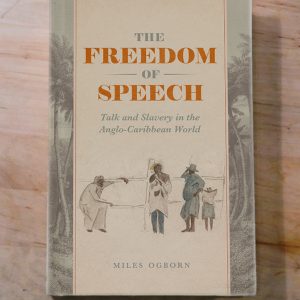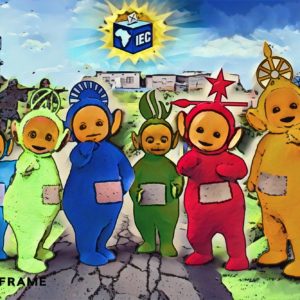George Orwell is watching you
In Text Messages this week, the author would have approved of Raymond Zondo’s and Sue Gray’s plain-speak, even if Aristotle disagreed with him on justice.
Author:
3 February 2022

An ugly word for a nasty deed. Redact. Strictly speaking, a rare word and one that means simply to edit for publication. But politicians, civil servants, military and intelligence functionaries, and sundry government hangers-on have managed to imbue redact with the singular and sinister meaning of edit out – cut out, remove, delete, obscure – before publication.
All of which is a real-life demonstration of the etymological root of redact, the Latin redigere, “to bring back” – exactly what the hackers-out are doing. Once more government-speak strikes a blow to truth and meaning on its journey towards Newspeak, the content-free official language in George Orwell’s novel Nineteen Eighty-Four.
Related article:
In Orwell’s terrible world of Big Brother, individuality and freedom – of person, speech and thought – are discouraged and actively limited. Those sad excuses for lexicographers working on the 10th edition of the Newspeak Dictionary are zealously “chasing down old unnecessary words and chucking them down the memory hole”. They are fiendishly imaginative in their mission to cut, cut, cut: why should the opposite of “good” be bad, they ask. Much better is “ungood” and so “excellent” becomes “plus good” and “splendid” morphs into “double plus good”.
Euphemism abounds such that very soon the populace no longer has the verbal blocks to build a meaningful sentence or convey even a slightly complex thought. Which is what Big Brother wants: a docile, unthinking, uncritical and inarticulate mass. The “old speak”, with all its “useless shades” of meaning is gone, replaced by a narrow range of consciousness that makes “thought crime” impossible because there is not a sufficient vocabulary to express dissent. The dream of all autocrats and authoritarians – Donald Trump, Boris Johnson, Jair Bolsonaro, Narendra Modi, Recep Tayyip Erdogan, Viktor Orbán, Vladimir Putin, Xi Jinping, General Min Aung Hlaing (head of the Myanmar military), Abiy Ahmed, Bashar al-Assad, Mohammed bin Salman Al Saud et al – is achieved by the relentless monitoring, arrest, torture, re-education and effective brain-deletion of the Big Brother regime. And those are the fortunate victims.
‘Solidity to pure wind’
The evil wordmongers working to extend this population paralysis concoct slogans and special-interest organisations that chill in their Hitlerian register: “War is peace. Freedom is slavery. Ignorance is strength.” Hate Week. The Anti-Sex League.
There is much talk these days of dystopian fiction. Nothing contemporary – in fiction and academic work on dystopias real and imagined – comes close to the visceral reality and sheer horror that Orwell created. It was one of the most fortunate accidents of history, a privilege for a writer and thinker, that Orwell lived through and saw fascism, socialism and communism in their pomp.
What he would have made of so-called Westminster-style democracy in 2022 is not difficult to discern. He would have shown contempt for Johnson, a man for whom Orwell’s unforgettable sentence from his celebrated essay Politics and the English Language seems to have been written: “Political language is designed to make lies sound truthful and murder respectable, and to give an appearance of solidity to pure wind.”
Of course, as Orwell points out in that essay, “The word Fascism has now no meaning except in so far as it signifies ‘something not desirable’.” He adds, “The words democracy, socialism, freedom, patriotic, realistic, justice, have each of them several different meanings which cannot be reconciled with one another. In the case of a word like democracy, not only is there no agreed definition, but the attempt to make one is resisted from all sides.”
Related article:
Justice – now there’s a word and concept that goes to the heart of the investigations into state capture in South Africa by the Zondo commission and the Covid lockdown-breaking parties at 10 Downing Street in London by Sue Gray. Orwell would have approved of the clear and simple writing of both the Zondo report and the Gray “update”, models of conveying complicated situations involving multiple players in a direct and accessible way for the reader. Whether they achieve justice – the aim hoped for, if not stated – is moot.
But then to disagree with Orwell here is Aristotle, in his Nicomachean Ethics, on justice. The just person is one who does not break the law or violate the legitimate interests of others – literally, one who takes only his share of good things and his whole share of evil things. For Aristotle, justice depends on legality being upheld in the polis (the state) and equality existing among individuals. Even the casual observer of affairs in South Africa and the United Kingdom will see that neither of those necessary conditions exist in either place.
Justice for none rather than justice for all. But there is always the hope – because we are human and, as a poet once observed, “hope springs eternal” – that Aristotle’s ageless definition will one day come to pass on Earth: “The just, then, is the lawful and the fair, the unjust the unlawful and the unfair.”


